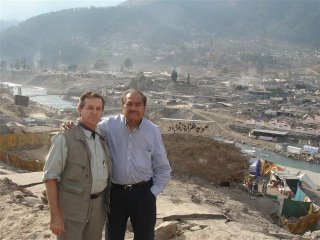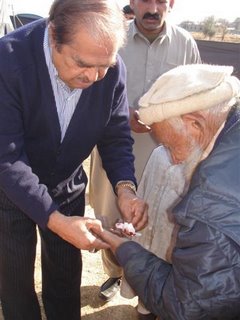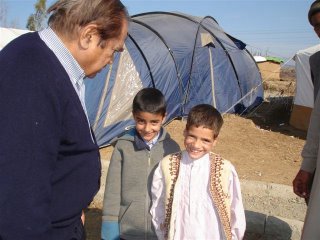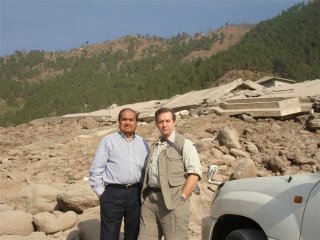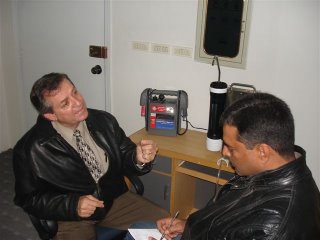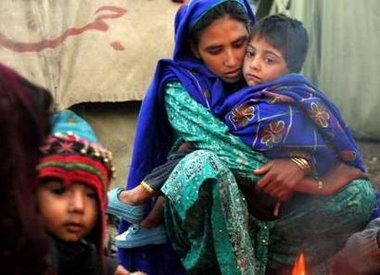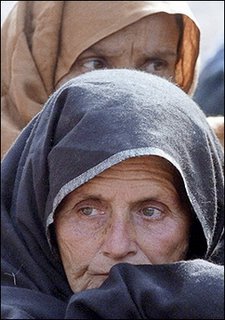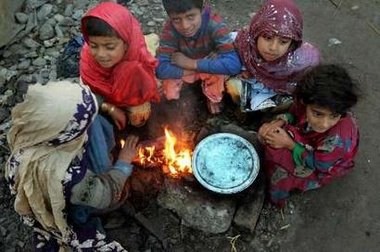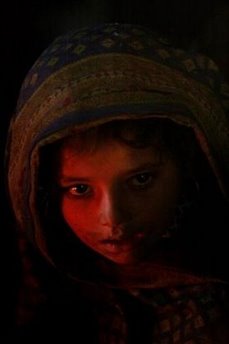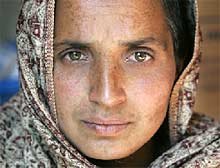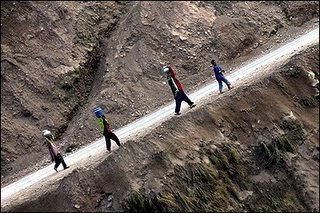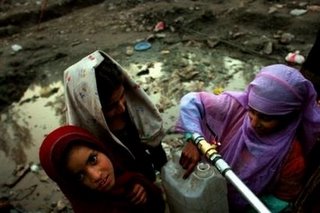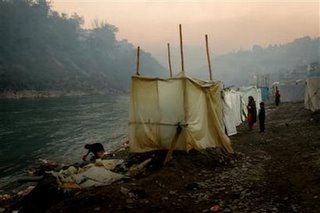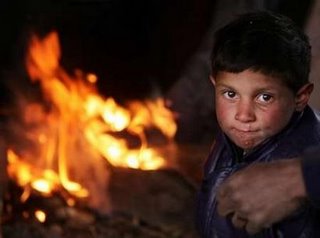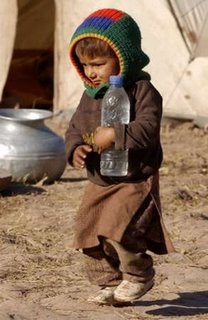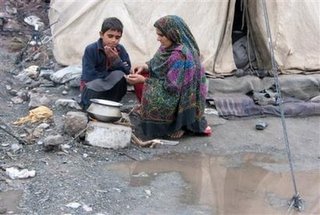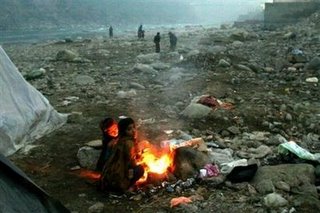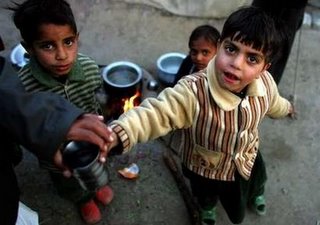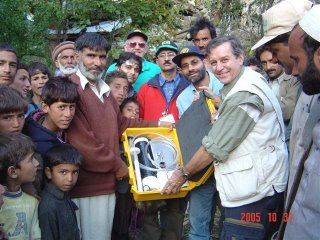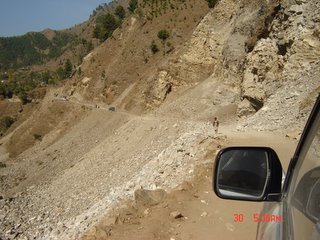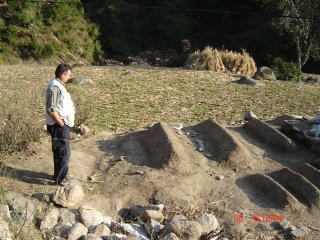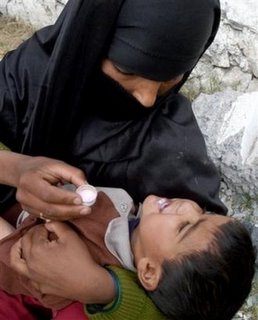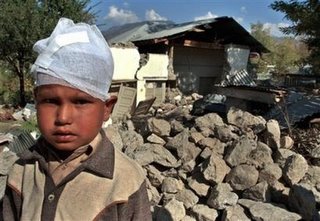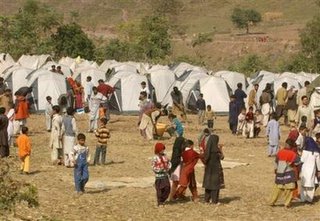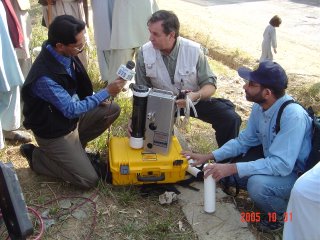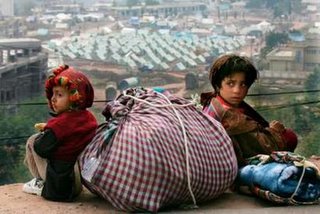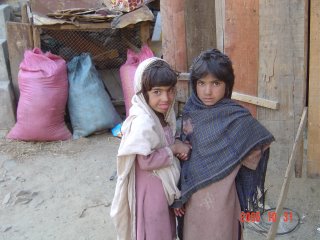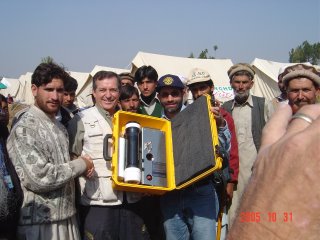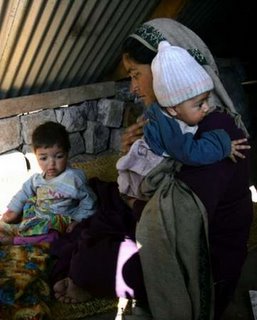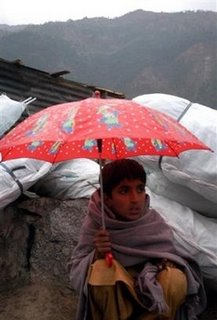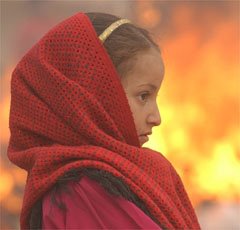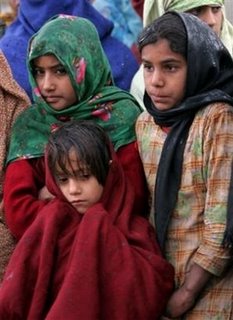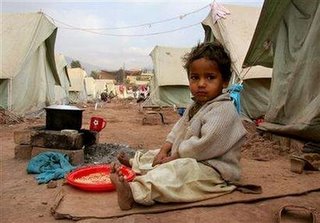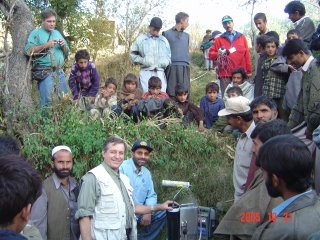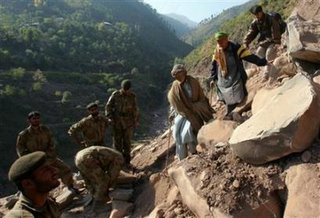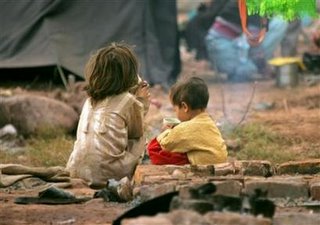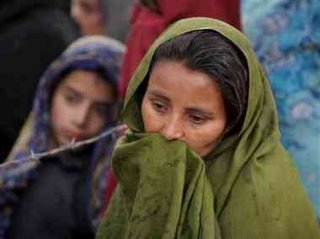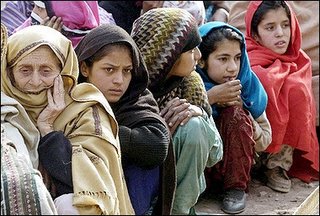
December 24, 2005 - 4:56am (Pakistan Time) - Islamabad, Pakistan - Report submitted by Joe Hurston
Actually, Merry Christmas Eve from Pakistan! Yes, I do miss being home with my family this Christmas. I thank our Lord for my family that loves me and understands the mission that I am on here in Pakistan. Other than being home with my family, the only other place that I would rather be on this entire earth is right here in Pakistan helping the victims of this terrible earthquake!
We're heading into ground zero(s) of the Pakistan earthquake a bit later this morning. Dr. Shaikh and I were at it again yesterday, knocking, asking and seeking help for the earthquake victims. The meeting with USAID went well, but we are in a long and complicated process to secure funding for the Vortex Voyagers TM. Time is not on the side of the victims of the quake. Though we have been diligently seeking funding since the earthquake hit, we have yet to hit that solid funding stream. We still search and ask! I would be lying to say that it doesn't get frustrating. We so want to bring help and it is so slow in coming. Meanwhile, people are dying! We keep marching on!!
All day yesterday, I kept thinking about that widow in Machiari Valley that we wrote about in yesterday's report (scroll down to the December 23, 2005 and read the article: PAKISTAN: Widows in quake area battle to survive). Her name is Mariyam. What could we do to help? Why not go and seek to find her? Check on her village and see what we could do to help. Throughout our day of meetings yesterday, I sought to identify where this valley is. We still are not sure where it is, but after long discussion and prayer, Dr. Shaikh and I decided to just strike out and go find her and the little hamlet Duliard.
We hope to obtain quality information about the condition in the camps, particularly the spontaneous camps that are not run by the Pakistan Government. The reason for that is that for the most part, these camps are not monitored (due to the sheer magnitude of them). For example, in one area, according to governmnt reports from yesterday, there are 35 government camps and over 400 non-government camps! These are the areas that we believe the Vortex Voyagers TM will play an integral role in saving lives and improving the health and strength of the earthquake victims.
During our time in these zones, we will likely be out of touch with our reports so if you don't hear from us for a couple of days, you'll know what we're up to. Tomorrow, when Christmas comes, PLEASE REMEMBER to pray for the 3.5 million people who have been left homeless and for the 500,000+ that are at extreme risk. Below are two articles that graphically depict the actual winter and emotional conditions that exist here in Pakistan.
Lethal cold threatens Pakistan quake survivors Fri Dec 23, 4:22 AM ET
Thousands of Pakistan's quake survivors are caught in a desperate struggle for survival in the Himalayan cold and need urgent help.
"The falling temperatures could be lethal," British-based Oxfam director Barbara Stocking told a news conference on Friday, after a tour of areas ravaged by the October 8 earthquake in Pakistan-controlled Kashmir and northwestern province.
The warning came three months after the country's worst natural disaster that killed more than 73,000 people and left an estimated 3.5 million homeless.
Around 1,000 US troops and NATO units have been helping Pakistan in relief and rehabilitation efforts of survivors, shuttling supplies by helicopter and treating the injured at field hospitals.
Stocking called for an enhanced international response to the United Nation appeal for around 550 million dollars, launched in November, which had so far brought in only 40 percent of the needed funds.
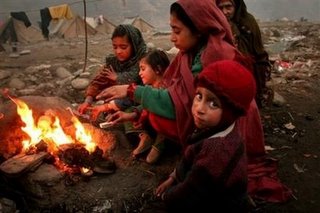
Children are falling sick in the freezing temperatures suffering from respiratory ailments while heating has been a problem because of the risk of tent fire, Stocking said.
She said Oxfam had provided shelter to 127,000 people and improved water and sanitation conditions for some 150,000.
"There is so much more that needs to be done urgently. We need to improve conditions in the spontaneous camps and reach those who have stayed further up the mountain," she said.
Oxfam urged the international community to honour its pledges and deliver resources to prevent another humanitarian catastrophe.
Pakistan has received aid pledges of more than six billion dollars, of which two billion dollars is in the form of grants.
Here's the second story that depicts the EMOTIONAL state that exists in some camps.
PAKISTAN: Frustration at quake camps
23 Dec 2005 10:46:51 GMT Source: IRIN
BALAKOT, 22 December (IRIN) - Patience seems to have run out among some earthquake survivors in Balakot, at the lip of the Kaghan Valley in Pakistan's mountainous North West Frontier Province (NWFP). Many of those living in the tents dotted across the devastated landscape of the town are angry, and make no attempt to hide it.
"Just look at the situation here. People are dying of the cold, the living conditions are filthy and no one is helping us," said Aziz Hussain, his shrill tones swiftly drawing a small crowd that gathers around him. Many nod sympathetically as he adds, "I just don't understand what is happening to all the money we hear is coming in. It's certainly not being used here."
Many survivors of the 8 October quake say they are now desperate. An aged woman hugs a small grandchild close to her as she sits close by her tent. Despite the fact that the sun is shining, the icy breeze has a chilling effect – especially with many quake survivors still lacking sufficient warm clothing, bedding, and adequate tents or heating arrangements.
Nearly 10 weeks after the quake, many victims are still in a miserable state, with the arrival of winter having added immensely to the hardships they face. Often cooking fires or oil stoves offer the only source of warmth, with families huddled around them through much of the day.
Poor sanitation, a lack of toilets and an absence of cooking arrangements add to the stench that lingers around many camps, with rotting rubbish lying in heaps in some areas. The conditions are ideal for disease to spread and diarrhoea, pneumonia, scabies and lice infestations are common.
"My children have not had a bath for nearly three weeks at least. The best I can do is clean them with wet washcloths. There is never enough hot water and I can't possibly bathe them in cold water as I did until a few weeks ago," said Unaiza Bibi, 27, the mother of three children under eight years old.
With matted hair, welts indicating scabies visible on their arms and perpetually runny noses, the children show the effects of the conditions in which they live and there seems little hope that there will be much improvement before spring next year. "We can only hope we will stay alive till then," Unaiza said.
Balakot, a town that was once home to nearly 300,000 people, located some 220 km north of the Pakistani capital, Islamabad, was one of the areas worst hit by the quake. Even now, barely a few buildings peek out above the ground, while makeshift shelters of every shape, size and description have cropped up across the area.
Rubble has been partially cleared, but large piles of it still lie in some areas. Since the earliest days of the quake, the town has been a focal point for the relief effort, with aid supplies and volunteers pouring in. The fact that despite this, the situation remains so bleak is testimony to the immense difficulties involved in helping the survivors of the quake, and also a reminder of the need for the aid effort to continue.
A few days ago, Jan Vandemoortele, the UN's humanitarian aid coordinator in Pakistan, warned after visiting camps in Pakistan-administered Kashmir that the onset of winter and snows could lead to clashes at camps as people became increasingly frustrated. "We are preparing ourselves for the worst, because it could be ugly," Vandermoortele said, while maintaining that preparations for any situation that might arise were fully in place.
Some local NGOs operating in Balakot have packed up and withdrawn, citing resource constraints as the reason why they are unable to continue their relief efforts. The perception that the outside world may be deserting them has added to the panic among some survivors based in the Balakot area. Families across the region have now started to stockpile what they can in fear that the delivery of goods may dry up over coming weeks.
In some cases, local police have had to move in to calm the situation. Further north from Balakot, in the mountains of the Kaghan and Allai valleys, conditions are said to be worse, even though the World Food Programme (WFP) has rapidly delivered stocks for winter to people who have opted to remain close to their homes. Many of the villages are already inaccessible.
The focus of aid has now shifted to people based at camps and at lower altitudes. Efforts are on to try and expand facilities available at tent villages and to provide better protection from the cold. Waterproof sheets are being distributed and many local and international groups are racing to help set up shelters before snow covers the ground and blocks off roads to villages located in the mountain valleys.
"People have shown great fortitude and immense patience since the quake. But there is a limit to how long they can suffer in silence. Their anger is quite understandable," I A Rehman, Director of the Human Rights Commission of Pakistan (HRCP), said.
IRIN news
As these two stories indicate, the situation here in Pakistan is desperate. Please pray that our Lord uses us to bring help and grace and love to these precious people during this terrible time.
God Bless You and thank you for taking the time to read our report. If I don't get a chance to report tomorrow, MERRY CHRISTMAS!!
Sincerely:
Joe Hurston - President Air Mobile
PLEASE CONTINUE TO READ THE REPORTS BELOW, PARTICULARLY THE STORY: "PAKISTAN: Widows in quake area battle to survive"
